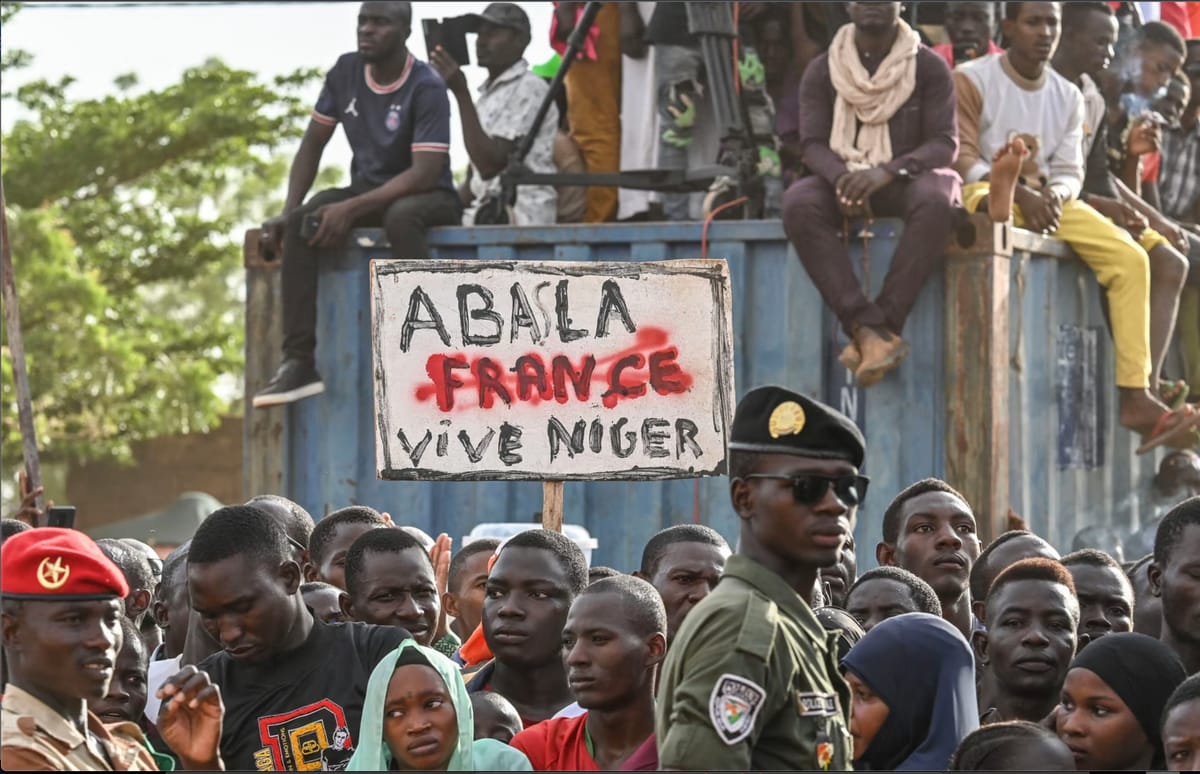Niger Asked France to “Leave My Country” after the Military Coup

By Sophia Agosta BA International Relations
Following a statement released by their Ministry of the Armed Forces, France is withdrawing the approximately 1,500 French troops stationed in Niger. The French Ambassador in Niger has also departed from the country. This action follows a military coup in July, which ousted Nigerien president Mohammed Bazoum, who had been in power since the 2021 presidential election.
French President Emmanuel Macron denounced the Military Junta controlling Niger that came to power following the coup, demonstrating support for the ousted President Bazoum. Macron stated; ‘We do not recognize those who carried out the coup.’
The Military Junta increased pressure on Macron to dispel French troops from the country, resulting in the ‘end of French military cooperation with Niger.’
France originally stationed their troops in Niger to aid in combating jihadist groups. According to Al Jazeera, the Sahel region is now an ‘epicenter of violence’ because of the active presence of militia groups associated with ISIL (ISIS) and al-Qaeda.
Emmanuel Macron stated; ‘We’re in Niger because we were invited by Niger and several other countries in the region to come help fight terrorism.’
France has been present in the Sahel for hundreds of years, reflecting a colonial legacy. Analysts from the BBC explained France’s responsibility for the instability in the region. Despite their independence, France has remained an influential actor in its former colonies in West Africa, consistently supporting the rule of pro-France leaders in the region.
Anti-French sentiments have been growing in Niger and in other former French colonies across the Sahel. BBC interviewed a Nigerian who said; ‘Since childhood, I’ve been opposed to France…They’ve exploited all the riches of my country such as uranium,’ showcasing a personal anti-French sentiment and mistrust in their motives for occupation.
Military Juntas are also present in Mali and Burkina Faso, holding strong opposition to the French presence in their countries. BBC reported; ‘Allegations that President Mohamed Bazoum was a puppet for French interests were used to legitimise his removal from power.’
‘There’s an anti-French sentiment to be exploited,’ said NPR reporter Eleanor Beardsley. They explained that there are other actors, notably Russia, who have gained influence in the region.
BBC suggested the catalyst for the coup was President Bazoum’s plan to reorder the military and remove Abdourahmane Tchiani, former head of the National Presidential Guard and current head of the state, from his position. Tchiani had previously led an attempt to overthrow Bazoum during a military coup in 2021.
Tchiani expressed in a public statement the reasons for the coup, citing the previous government’s economic shortcomings and failures to combat terrorism and generate stability in the country. ‘The security approach today has not brought security to the country despite heavy sacrifices,’ said Tchiani.
Nigerien activist Maikoul Zodi pointed out in an interview with Deutsche Welle that he considered France’s official military withdrawal a ‘clear victory’ because of Macron’s previous stance that he would only comply under a directive from Bazoum. He said; ‘Now the Nigerien people have shown that Niger belongs to Nigeriens,’ demonstrating his belief that this is a celebratory event for Niger.
After France’s promise to withdraw troops, Niger’s National Council for the Safeguard of the Homeland stated; ‘We celebrate a new step towards the sovereignty of Niger,’ exhibiting that imperialist and neo-colonialist forces are no longer welcome on Niger’s national territory.
Although they have faced backlash for the coup, including the withdrawal of funding from the US and European Union and economic sanctions from other African states, the Military Junta remains in power in Niger.
Whether Niger’s regime change and expulsion of the French military will lead to more peace and stability for this nation is debatable, with Fair Planet calling out the risk of exacerbated terrorism in the region. ‘The celebration may not last long,’ said Mutaru Mumuni Muqthtar, a Ghanaian political analyst, in an interview with DW.
‘Niger does not have the capacity to propel itself to prosperity, to stability, to ensure the sustained gains against the threats that it is currently dealing with,’ added Muqthtar.
In sharing their perspectives with DW, Nigeriens noted that regardless of the challenges faced by the country, they aim to reclaim Niger and take steps forward without France. A resident from Niamey expressed anti-French sentiments; ‘They haven’t been able to eradicate terrorism, so they have ulterior motives.’ Another resident from Niamey expressed his view, ‘The French military must leave immediately because we really don’t need them’.
Activist Ali Idrissa said with DW; ‘We will remain vigilant and ensure that a clear withdrawal plan is developed to do justice to our task.’




